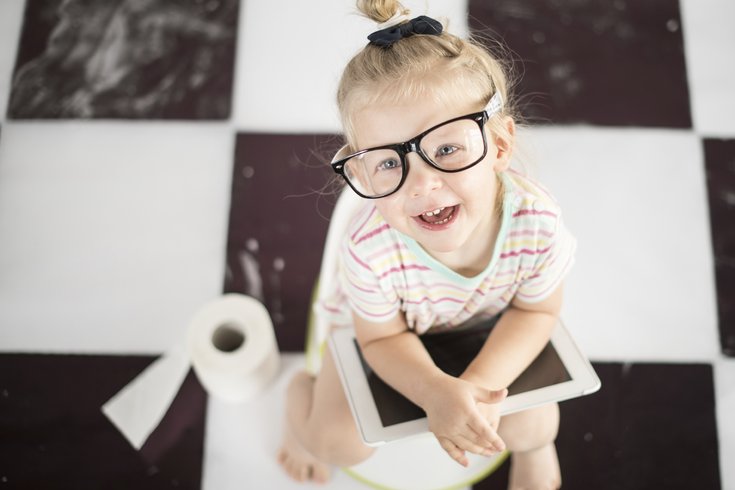Dear Amy,
Recently, my mother came to visit. Throughout her stay, she frequently and negatively criticized me because my 2-year-old daughter “still” wears diapers.
My mother offered up a great deal of unsolicited advice on how I should “train” my daughter. She promised that toilet training would be complete within a matter of two days if I followed her lead. According to her, I should: immediately throw all diapers away, have my daughter drink large amounts of water every 30 minutes, set a timer indicating that it was time to pee, let her “learn her lesson” if she dirties her underwear, and firmly expedite toilet training. She joked that an occasional jab with a diaper pin would hurry the process along.
You should know that my mother is a rather complicated authoritarian. My positive childhood memories are painfully punctuated by her harsh words and violent temper. I have no intention of passing along this pain and I oppose the method of toilet training she advocates.
Yet, I wonder, what is the best way to transition my daughter out of diapers?
Sarah, Newtown
Dear Sarah,
Thank you for reaching out to me.
I’m sure it was difficult to be frequently criticized by your mother during her last visit. It’s never easy to be the subject of such negativity. You are aware of your own childhood wounds and committed to creating a more nurturing and positive environment wherein your daughter can thrive. I commend you for this. Such self-awareness and commitment are central to parenting best practices whether one is reflecting upon how to respond to tantrums or transition to diaper-free living.
Interestingly, a small minority of American parents eschew the use of diapers. After all, the vast majority of infants across time and culture didn’t (or don’t) wear them. There is a growing interest in elimination communication, known in natural parenting circles as EC. Proponents of EC focus on the careful observation of a baby’s elimination signals and the gentle cueing of elimination. For children who grow up diaper-free, the question of toilet training in the toddler years is mute.
However, your daughter is 2 years old and the path to diaper-free living is just beginning. Like the majority of American parents of toddlers, you are wondering what is the best manner of approaching the subject? It’s clear you are looking for gentle techniques as you oppose your mother’s dictatorial attitude.
In her Aha! Parenting blog article entitled, “Easy Potty Learning for Toddlers,” renowned child psychologist
Dr. Laura Markham writes, “You don't actually need to ‘toilet train’ your child. Instead, set up conditions so your child can learn. Your goal is to make it as easy and effortless as possible.” I like this. To approach the task as something that is learned empowers your daughter. You don’t need to “train” her. Simply focus on setting up the conditions for learning to unfold with ease.
Like you, my husband and I started the toilet learning process when our son was 2 years old. By this time, he was showing many signs of toilet learning readiness. Six months later, he could confidently respond to his own body’s cues and was completely diaper-free. The diapers at bedtime and naptime were the last to go.
My husband and I encouraged the process with both practicality and kindness. We said things like, “This is what we do every night. We always pee before going to sleep. Let’s read one of your favorite truck books together while you go.” We never set timers or pressured our son to consume large amounts of water. We didn’t give him stickers or candy as rewards. There was no rush, no need to get the task done within two days -- let alone two months. We taught him the ropes, let him watch us use the bathroom, put his red colored, child-sized potty in his room so he had full access to it, and joyfully sang an original “Happy Pee-Pee” or “Happy Poo-Poo” dance when he got it right. We approached the occasional accidents with an easy attitude. “Yes, accidents happen. I’m sure you’ll make it to the potty next time.” Basically, we set the stage and let the process unfold by itself.
It took six months. Ours was a smooth, gentle and remarkably easy transition to diaper-free living.
Markham’s wisdom in emphasizing a toilet learning (vs. a toilet training) process stems from years of studying child development, her practice as a well-respected child psychologist, and her interest in drawing upon the best of peer-reviewed scientific studies relating to attachment theory. Her book, “Peaceful Parent, Happy Kids: How to Stop Yelling and Start Connecting,” influences my parenting more than any other. Like Markham, I share a passion for reflecting upon cutting-edge studies that relate to optimizing human potential. How can we best nurture the development of empathy, kindness, confidence, and joy in our children -- and ourselves?
A gentle, clear and patient approach to parenting, let alone living, is so needed in our world. While these qualities help us wisely navigate through life’s obstacles, they are also central in helping parents successfully set needed limits for growing children. Gentle parenting isn’t “permissive” parenting. We don’t let a child pee or poop freely in the house. There are limits. Yet, they are taught with a heart infused with kindness. “Connect before you correct,” I often tell myself.
For those of us who came from families where an authoritarian model of parenting dominated, it isn’t always easy to respond so mindfully. In “Peaceful Parent, Happy Kids,” Markham observes, “…many of the challenges children face in normal development are completely avoidable. In fact, we as parents often inadvertently create them.” It takes time to unravel the knots of grief that surround the creation of unneeded challenges or wounds. But as we do this, we free both our ourselves and our children.
Learning to use the toilet is a part of normal development. Children don’t need a heavy handed, critical/negative, or impatient parent to add psychological challenge to their experience of mastering these basics. Whether parents practice EC in the earliest months or wait until the toddler years, the task of learning how to live diaper-free can be completed without struggle.
Sarah, I fully support you in consciously moving away from models of negativity, control or coercion in parenting. I suggest you read more about gentle toilet learning. Pick up children’s books about using the potty to read to your daughter. Notice signs of your daughter’s readiness to take on this next adventure in learning and, most importantly, be patient with the process. Remember, it will unfold in its own time.
Thank you again for writing me. May these words help support you as you parent with gentleness and wisdom.
Peace,
Amy

 File Art /for PhillyVoice
File Art /for PhillyVoice